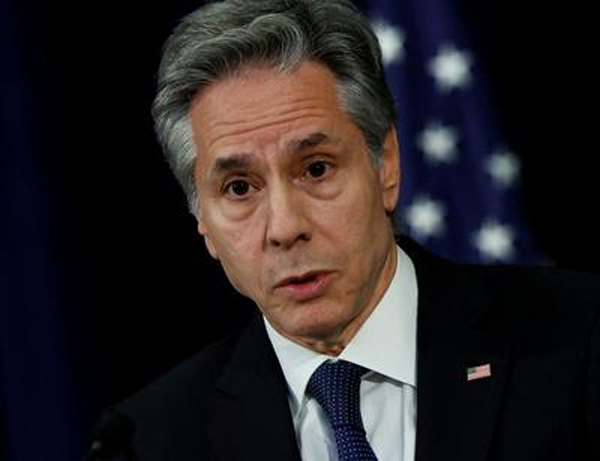News Flash
News Flash

TEL AVIV, Feb 7, 2024 (BSS/AFP) - US Secretary of State Antony Blinken was
in Israel on Wednesday, where he was expected to press for what he called an
"essential" truce agreement as the war with Hamas entered its fifth month.
The diplomat was due to meet Israel's leaders as part of a Middle East crisis
tour after earlier stops in Saudi Arabia, Egypt and Qatar.
Qatar, which mediated a temporary ceasefire earlier in the conflict, said
Hamas had given a response to a new proposed deal to pause the fighting.
"The reply includes some comments, but in general it is positive," Qatari
Prime Minister Mohammed bin Abdulrahman Al-Thani said after meeting Blinken
in Doha.
Hamas confirmed it delivered its response to proposals hammered out a week
ago in Paris between Qatar and other mediators.
Blinken said Hamas's reply had been "shared" with Israel and he would discuss
it there on Wednesday.
He also said there was still "a lot of work to be done" but that he believed
"that an agreement is possible and indeed essential".
Israel's spy agency Mossad also received the Hamas response, Prime Minister
Benjamin Netanyahu's office said, and "its details are being thoroughly
evaluated".
Netanyahu, who has yet to comment directly on the response, said on Tuesday:
"We are on the way to the total victory and we will not stop."
Pressure for a ceasefire has mounted as Israeli forces push towards the town
of Rafah on Gaza's southern border with Egypt, where more than half the
besieged territory's population has taken shelter.
"To be clear, intensified hostilities in Rafah in this situation could lead
to large-scale loss of civilian lives, and we must do everything possible
within our power to avoid that," said Jens Laerke, spokesperson for the UN
aid coordination office OCHA.
- 'Children scared all the time' -
The war started with Hamas's unprecedented attacks on Israel on October 7,
which killed about 1,160 people, mostly civilians, according to an AFP tally
based on official Israeli figures.
Militants also seized around 250 hostages, with Israel saying 132 remain in
Gaza.
Vowing to eliminate Hamas, Israel has launched air strikes and a land
offensive that have killed at least 27,585 people in Gaza, mostly women and
children, according to the health ministry in the Hamas-run territory.
The campaign has devastated swathes of Gaza, destroyed hospitals and
displaced half of its population of 2.4 million, while food, water, fuel and
medicine are in dire shortage.
Heavy strikes and fighting continued on Tuesday, with Gaza's health ministry
saying at least 107 people were killed in 24 hours, including six policemen
securing an aid truck in Rafah.
"I was in front of my house, sitting next to this shop, I saw a police car
passing by and suddenly it exploded," said a Palestinian man who described
witnessing the strike. "I couldn't hear anything because of the intensity of
the explosion."
Israel has warned it could push on into Rafah as it pursues the militants.
The army "will reach places where we have not yet fought... right up to the
last Hamas bastion, which is Rafah", Israeli Defence Minister Yoav Gallant
said earlier this week.
Safia Marouf, who sought refuge in Rafah with her family after being uprooted
from their home further north, said she is afraid of what is to come.
"The children are scared all the time, and if we want to leave Rafah, we
don't know where to go. What will be our destiny and that of our children?"
- Diplomatic push -
After meeting Blinken in Doha, the Qatari premier said he was "optimistic"
about the truce, but declined to discuss Hamas's reply in detail, citing the
"sensitivity of the circumstances".
Last week, a Hamas source said the proposed truce calls for a six-week pause
to fighting for a hostage-prisoner exchange, as well as more aid for Gaza.
On Monday, Netanyahu said Hamas had presented "demands that we will not
accept" for an exchange involving thousands of prisoners.
The Israeli leader is under pressure to end the war and bring the hostages
home, amid divisions within his cabinet and public fury over the fate of the
remaining captives.
Israeli troops, with air and naval support, have been engaged in heavy combat
centred on Gaza's main southern city of Khan Yunis, the hometown of Hamas's
Gaza chief, Yahya Sinwar, accused by Israel of masterminding the October 7
attack.
The United States has strongly backed Israel with munitions and diplomatic
support but also urged steps to reduce civilian casualties.
"The humanitarian situation in the Gaza Strip is beyond catastrophic," said
Tommaso Della Longa, spokesman for the International Federation of Red Cross
and Red Crescent Societies.
Around 8,000 displaced people had been evacuated from the besieged Al-Amal
hospital in Khan Yunis, where they had sought refuge, after weeks of heavy
shelling and fighting nearby, he added.
- Regional violence flares -
Violence has also flared in Lebanon, Iraq, Syria and Yemen, where Iran-backed
groups have launched attacks in support of Hamas, triggering counterattacks
by Israel, the United States and its partners.
Israeli strikes on the Syrian city of Homs killed five people, including
three civilians, on Wednesday, a war monitor said.
Its fighter jets had also targeted bases of the Iran-backed Hezbollah
movement near Marwahin and Meiss El Jabal in southern Lebanon.
Yemen's Iran-backed Huthis have meanwhile for weeks been targeting what they
say are Israel-linked ships in the Red Sea and Gulf of Aden in solidarity
with Palestinians.
The attacks have disrupted global trade and prompted reprisals by US and
British forces.
Last week, the United States carried out strikes on Iran-backed groups in
Syria and Iraq, killing dozens in retaliation for a deadly attack on its
troops in Jordan.